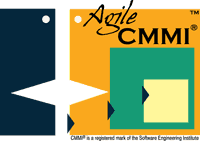NOTE: The following message was graciously sent to me yesterday. I’ve received permission to post it to the blog and I’ll also post my reply.
Dear Mr. Glazer,
I’m an Agile supporter since before the word Agile had been chosen to identify this group of approaches. I served the Agile Alliance board of directors for two year and was previously (heavily)involved with the Rational Unifed Process and CMM. This is just to say that I’m supposed to have some real world, day to day experience, not to impress you in any way 
I believe, like you, that at some level Agile and CMMI can cooperate
without problems but I think tradeoffs are needed mainly in principles and perspectives.
What I can see working is, as you write, wrapping agile practices with CMMI:
- agile practices for software development
- CMMI for software management
As you can see I’m using ‘agile practices’ instead of ‘Agile’ because I think this is the biggest tradeoff you need to do in order to integrate both. Otherwise I think they should really be kept separated.
I’ll try to explain myself: every organisation can improve its process adopting one or more agile practices without becoming Agile and I think this is fine as far as it serves its purpose and I see it fitting lots of realities. You know, at the end an approach needs to fit the organisation culture otherwise it will have hard times.
That is because I don’t agree in saying that Agile is just a bunch of (engineering) practices. As I’m sure you already know an Agile approach *requires* a mentality shift for the organisation as a whole.
XP is Agile but Agile is not XP and, for example, Scrum is 90% about
management, and it’s fully compatible with XP while in its fundamental principles it is not with CMMI.
I’m interested to know more about your phrase: “where XP ventures into management methods, they are not incompatible with CMMI” for two reasons:
1) because while I have practical experience with waterfall, RUP, CMM and Agile (above all) I’ve just read about CMMI and I don’t like to speak with theoretical knowledge only
2) because I like to know more 
Even if I tried to keep this email short I failed even if I feel I would need pages and pages just to put some order into my thougths.
Thanks in advance for your time, regards
Marco Abis
http://www.agilemovement.it :: Italian Agile Movement
http://www.agilityspi.com – Agility Software Process Improvement
http://www.thoughtworks.com – The Art of heavy lifting
My Reply:
Marco,
Thank you so much for writing!
I agree that we should be careful about how we use “Agile” and “agile”.
I will try to be more careful and consistent in the terminology.
I also agree that agile is more than engineering, especially when we want to look at agile as a change in development practices at a very fundamental level, beginning with addressing the very paradigms of engineering practices.
On the matter of Scrum, however, I would have to disagree with your assertion that the approach is incompatible with CMMI. In fact, I love the impact Scrum has on an organization’s CMMI practices. Perhaps (you tell me) your position comes from experience with the strong implication in the SW-CMM (not CMMI) and in the assessment / evaluation method for SW-CMM on documentation which would be hard to satisfy w/Scrum. In that regard, CMMI is a marked improvement over SW-CMM.
The reason I see “management” aspects of XP to be compatible with those of CMMI is because the two “bodies” are actually addressing different (non-overlapping) aspects of management. More importantly, both have, at their core, strong influences of what “good management” is.
At today’s SEI SEPG Conference, David Anderson nicely presented a view of Agile’s Principles as they reflect Deming’s TQM principles. The coverage was complete. Neither set exluded the other.
Now, a question for you before we continue this thread: until I integrate a bulletin board onto the blog page, would you mind if I blogged your email & my reply and we continued our discussion there?
Cheers!!
–>> Hillel



